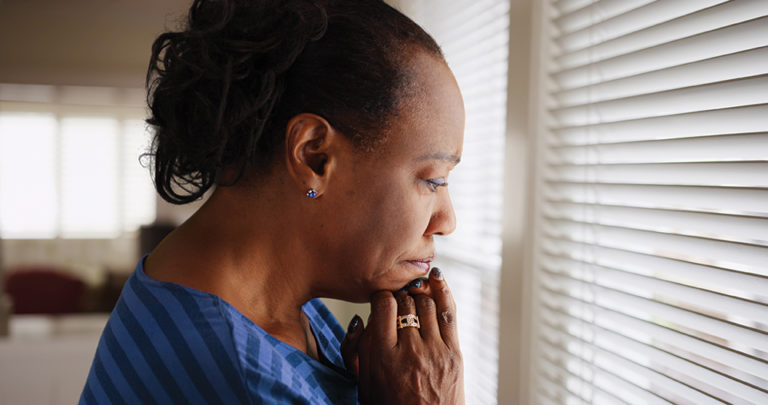How to handle emotional stress from tough caregiving decisions
Louisa McKellaston’s father was diagnosed with cognitive impairment several years ago, but several life-altering events — his retirement and a couple of moves — had contributed to significant memory decline over the past year. Then McKellaston’s mother died unexpectedly in March.
“We brought my dad to live in our home, mostly because we weren’t sure how he would be able to care for himself, especially with the shock of my mom’s death,” McKellaston says. “That was the week that the state really put us on lockdown [in response to Covid-19], so we didn’t want to have to worry about him forgetting that he couldn’t go out to get groceries.”
After her father was with them for two days, McKellaston and her wife realized her father would need more hands-on care than they could provide, particularly because they’re also parents of a young child. So she and her brother began to search for a community where her father could receive residential memory care.
While McKellaston came to the conclusion rather quickly, it was not without the emotions that typically accompany such big caregiving decisions. “Initially, I felt some guilt about it, because I don’t think my mom would have come to this decision in the near future at all, until there had been some sort of physical event with him,” McKellaston says.
Guilt is particularly common when adult children of aging parents are faced with such decisions. Whether it’s simply taking away the car keys or placing a parent in residential care, such moments carry an emotional toll.
To mitigate that emotional strain and guilt, families should discuss future caregiving needs well before they occur, says Melissa Tucker, director of family services for the Alzheimer’s Association Illinois Chapter.
Too often, families wait for a triggering event, such as a physical injury or major memory loss, before they act. By that time, an older adult may not be able to participate in the decision-making about their care. “We really encourage a lot of our families that we work with to have those really difficult conversations before it gets to a crisis point,” Tucker says.
But even if a parent has previously said they want to stay home, they may eventually need residential care. Going against those stated wishes can weigh heavily on adult children. In those scenarios, Lauren Sherman, Chicago-area director of LivHOME, a senior caregiving and care management agency, advises exploring the cause of the guilt. She suggests asking yourself, “Why is it that I’m feeling guilty? Is it because I’ve failed? Or is it because this was totally against my mother’s wishes?”
Exploring those answers can help adult children move toward considering the benefits of residential care. As they think about wanting the best situation for their parent, they might become more open to other options, without the guilt.
“Start to think about some of the benefits of moving into a place and weigh the benefits of being there versus the benefits of being home,” Sherman says.
Paradoxically, choices that seem to remove some independence can actually provide the aging parent, as well as the entire family, with more confidence about their well-being.
“Everybody wants this person to have the highest quality of life that they can,” Tucker says. “You want them to be healthy. Social engagement is very important for a person with dementia. If you’ve got that person living alone or with one caregiver, it’s very exhausting and isolating.”
Reframing the difficult emotions in terms of how they are an expression of loyalty, love, and care can help caregivers focus on how to provide their loved ones with the best options.
This is how McKellaston was able to navigate her own guilt. She says that realizing the speed of her dad’s mental decline and knowing that living with her would limit interaction with his peers “sort of took that guilt away.”
Getting Through the Guilt
Coping with guilt over a caregiving decision? Consider these tips:
- Make plans early
One way to cope with guilt is to preempt it by having conversations about care early, while loved ones can participate in the decision-making, says Melissa Tucker of the Alzheimer’s Association Illinois Chapter. Alz.org has resources for families to have open and respectful conversations. - Find a support group
“I think the best thing that caregivers can do for themselves is to join a caregiver support group,” Tucker says. Caregivers often experience isolation, and a support group can ease loneliness. “All of these decisions that you’re struggling with? Everybody in that group will either be going through it or have gone through it.” - Talk to someone
Sometimes, caregivers need to talk with someone who understands what they’re going through or can help them get perspective. For help any time of day, the Alzheimer’s Association helpline (800-272-3900) is free and available 24/7. - Seek outside assistance
Writing a pro/con list and getting a professional assessment of your situation can help you clarify decisions. Some agencies, such as LivHOME, provide this service. “We’ll help you to navigate through that decision a little better and really be well informed,” says Lauren Sherman, LivHOME’s Chicago-area director. “Rather than trying to do this on your own, it’s important to bring in help.”







